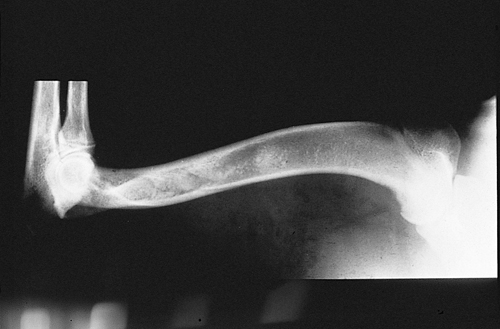Small Animal Emergency and Critical Care Medicine Q&A 18
This seven-month-old, male German Shepherd Dog started to become acutely lame on its right forelimb 5 days ago. The dog was presented as an emergency because of acute exacerbation in this limb. On physical examination the dog had a rectal temperature of 103.6°F (39.8°C); he was reluctant to stand and was only toe touching with his right forelimb once he did stand; no obvious external trauma could be seen. Orthopedic examination revealed no obvious skeletal fractures. Deep palpation of the left proximal ulna and the shaft of the right humerus was painful. Radiographs of the right humerus were taken.
| Question | Answer | Article | |
| What is your radiographic interpretation, and what are your differentials at this time? | Increased focal intramedullary densities that are very suspicious of panosteitis; this should be your working diagnosis. Differentials also include osteomyelitis and hypertrophic osteodystrophy. |
[[|Link to Article]] | |
| What is the treatment of this problem? | Rest and pain control with NSAIDs. Recommendations include buffered aspirin (10–20 mg/kg p/o tid). Side-effects of prolonged aspirin use include GI ulceration with vomiting and diarrhea, and altered platelet function. If NSAIDs are given over a prolonged period of time, misoprostol, a synthetic prostaglandin E1 analog, should be added (2–5g/kg p/o tid) for the same period of time. Other choices of NSAIDs include phenylbutazolidine, ibuprofen and flunixin meglumine products. Similar, sometimes stronger side-effects are observed with these drugs. Steroids are not recommended. |
[[|Link to Article]] | |
| What is the prognosis ? | Excellent. It is important to educate the owner about the progression of this disease. Clinical signs can be present until the age of 20 months, usually more than one limb is affected and the lameness shifts from one limb to the other. Pain relief should only be considered during the periods of lameness to diminish possible side-effects. |
[[|Link to Article]] | |
